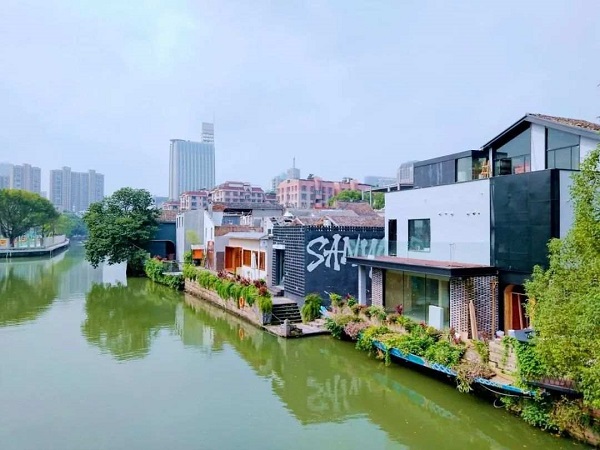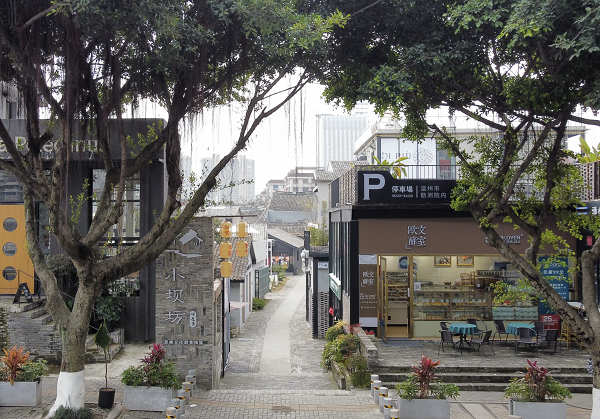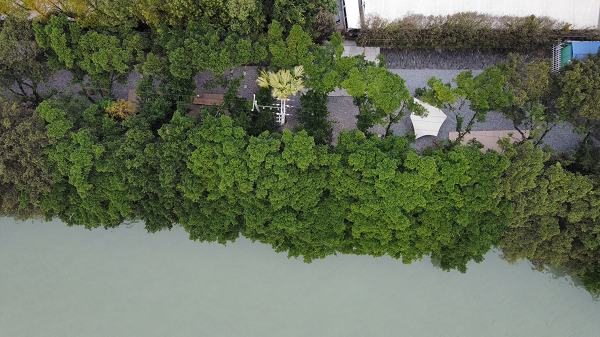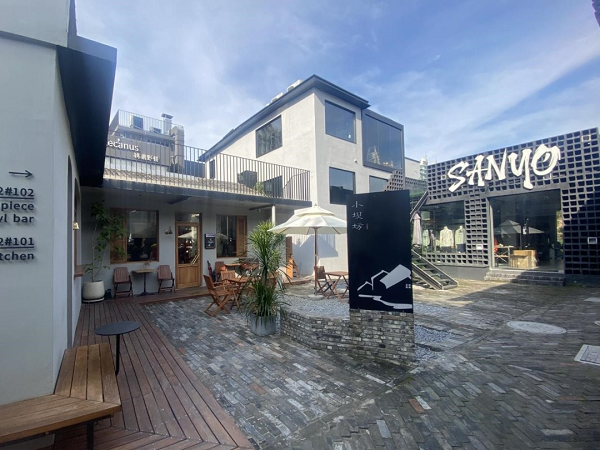Puxieshi Block Xiaobafang: A City Oasis Where Culture and Commerce Meet
时间:2023-05-24 13:56:12 来源 : DiscoverWenzhou 作者 : Hu Chaoran

Xiaobafang, located in Puxieshi block of Wenzhou's Lucheng district, is a green oasis where culture and commerce intertwine. It is becoming a popular destination for young people who enjoy experiencing traditional Chinese activities such as boating in Tang River while wearing Hanfu, brewing tea over small charcoal stoves, and sitting at wooden tables under an old bamboo awning. This scene represents a symbolic snapshot of the city's transformation under the"micro-renewal and fine enhancement" initiative.
Culture Empowers Micro-Renewals

As a pilot project of the"micro-renewal and fine enhancement" initiative, Xiaobafang Music-themed Slow Life Street reflects how cultural empowerment can rejuvenate the urban environment. The area was formerly an old residential community adjacent to Jiangjia Bridge. Due to the aging structures and illegal constructions, it required revitalization. Under the"micro-renewal and fine enhancement" program, the site retained its vintage architectural style while undergoing partial upgrades and functional replacements. By relying on the Wenzhou Tang River culture to help achieve harmony between business types, spatial arrangement, architecture, and atmosphere, the district sought to create a slow-life cultural ambiance that has since become a hotspot for photo-taking by visitors who seek both quality and aesthetics.

In recent years, as Lucheng district focused on driving the cultural industry, the"micro-renewal and fine enhancement" effort became integrated with the revival of thousand-year-old cities, the construction of scenic routes, and the promotion of Ou-Yueh culture's legacy. The district has"built an arena within a conch shell" by starting small, improving details, and focusing on minor aspects to create a quality, tasteful"poetic dwelling" for its residents. This approach has given rise to several distinctive cultural tourism projects such as Xiaobafang Music-themed Slow Life Street, Shuangjingfang, Urban Islands, and Iron Box 1.8 District.
New Businesses Upgrade Themselves
By connecting Wenzhou culture with the free music IP and immersing it in the urban business framework, Xiaobafang has not only created a landmark artistic exhibition but also aimed to build a new commercial model rooted in the district's cultural DNA. The area boasts diverse spaces and an array of businesses and is determined to stay"small but sophisticated" while continuously incorporating new avant-garde and creative merchants, resulting in a current total of 28 different types of shops, including"Seek·Trees under the bridge" Last December,"Cat Café" added another consumption option for customers, ushering in a new highlight for local shoppers. Its owner, Mr. Wang, hopes that his coffee shop can become a famous check-in spot soon.

Like Xiaobafang block constantly bringing in new products, these cultural tourism projects start from urban renewal and integrate culture into commerce. They draw on the essence of culture, commerce, and travel, making sustainable new business models the constant pursuit of tenants.
The new business models that emerge from the deep integration of culture, travel, and commerce have quietly risen in Lucheng, with the support of Lucheng District's initiative to inherit traditional culture and cultivate new cultural tourism consumption industries. Through the government's efforts, social capital is encouraged to compete and strive to maximize the power of spatial pattern updates and upgrade business formats, stimulating the vitality and potential of each block.
Lucheng is now opening the doors of cultural tourism, shaping tourism with culture and showcasing culture through tourism, thus embarking on the road of integrated development of culture, tourism, and commerce. In the future, more"happy blocks" such as Xiaobafang and Urban Islands, which depict the harmony between new trend culture and traditional life through the exchange of old and new, will emerge. From Poetry Road Ouhai River to Poetic Tonghe, each block will form a pearl necklace, and the beautiful picture scroll of the core area of the Oujiang Mountains and Rivers Poetry Road will eventually become a reality. (Hu Chaoran)

2c4ea2bc-d9b5-493f-bc3d-9f1647b95251.jpg)
ce540a96-4b0e-43b1-94ab-e211f5a5486d.png)